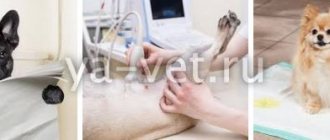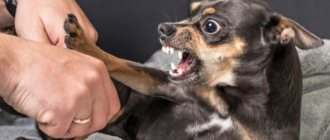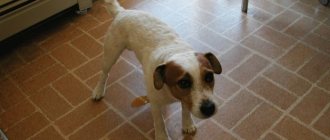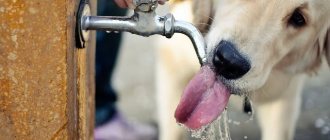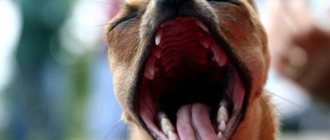As a rule, we don’t think about it: as soon as we feel the need, we look for the toilet. It doesn’t matter where we are: the toilet is almost always nearby. Dogs feel needy for exactly the same reasons we do: their bodies need to get rid of waste, too. However, unlike us, their “toilet” is not always accessible: visiting it often depends on the will of the owners.
When I brought my first puppy into the house, my parents were touched: “What a beauty!” But after 5 minutes, Daina poured a small puddle, and the parents’ mood changed: “She’s dirtying the house!” The door to the room slammed shut, and we were left in the corridor: me, Daina and her puddle. That’s how I realized for the first time: people have a special attitude towards the dog toilet.
At first, Daina did her business at home: it was frosty outside and she couldn’t go out for a walk. The only time I took her out to minus 10, she just trembled and whined - what a scripture! And in April, street adventures began - everything was new and interesting for the dog. Therefore, it didn’t come to the toilet right away. Only at the age of one year did Daina begin to ask consistently. She retained her cleanliness until old age. And at that time, the only thing that forced her to free herself at home was the fireworks, which frightened her for ten whole days of the New Year holidays.
The need for cleanliness is a basic need for animals.
In healthy animals, as in healthy people, the need for cleanliness is basic. This need is expressed not only in grooming, but also in maintaining order in your home. Cats clean up the excrement of their kittens, which are not yet able to move. The chicks back up to the edge of the nest to stick their butts out and “poop” on the ground. Burrowing animals create special toilet compartments, and some of them periodically move to get rid of accumulated dirt.
My hamster Masha also took care of the cleanliness. She created a toilet in the cage. After eating, she threw the garbage out of the window of the house, and every week she built a new nest from hay and cotton wool. Knowing the diverse needs of animals, Dutch farmers came up with a system for keeping pigs where animals can move freely (Nürtinger System). The pigs were given a place to sleep, play, eat and shower. They were also given a place for a toilet. As farmers say, if the toilet is occupied by a relative, the pig is ready to wait a little until he is free, just so as not to violate the rules of hygiene. Many times I have picked up sick hedgehogs and kept them in my home until they got better. When I stopped using the cage and allowed the hedgehogs to roam around the room, they created a place for themselves to use the toilet.
Puppies also try to be clean. My puppies created their own toilets - one in each room, in the farthest corner. But when they grew up, they began to understand that all the rooms are a single whole, and to relieve themselves they need a special place - the street.
At the dacha, dogs often classify not only the owner’s house as a clean zone, but also the surrounding area, for example, a garden. At the beginning of my dog career, I didn’t think about it and decided that at the dacha I could save morning walks. Therefore, at dawn, I let Daina out of the house and continued to sleep: the dog still didn’t bother me with toilet chores. But one day a neighbor called me and asked me to remove Daina’s heaps from his plot. It turned out that Daina did not dirty our garden because she went beyond the fence through a hole into the neighbor’s plot.
Why do people demand cleanliness from dogs?
The answer to this question is obvious and completely understandable: people find it unpleasant to clean up sewage. In addition, urine and feces left in the wrong place can ruin things and leave a lingering, unpleasant odor. Therefore, the myth arose that a dog has no right to be released at home. Despite the fact that dog toilets for apartments have now begun to spread, for many dog owners, any violation of this rule causes irritation and even a fit of rage. Uncleanliness almost always causes a desire to punish the dog. The most common punishments include rubbing the nose in urine and feces, hitting, screaming, and accusations of trying to dominate and seeking revenge. Some offending dogs are prohibited from entering certain areas, or are even relegated to the bathroom, kitchen, or crate.
Let's figure it out
Public opinion has literally fixed us on the “toilet problem.” So let's relax and look at the issue from a common sense point of view.
As you know, the body's release of feces and urine is a physiological act. An adult urinates 4 to 7 times a day and often gets up once at night; In general, he walks 1-2 times a day. In this case, the desire to release depends on the state of the body and arises spontaneously. We find restrooms literally at every step; they are almost always immediately available for an unlimited time.
For dogs, which are physiologically designed in exactly the same way, we have created completely different rules: we require them to be released on a schedule that is convenient for us. Some dog trainers even promote a training style in which the dog must be given a certain time to be released, and the dog is not allowed to be released without a command. Someone figured out how many hours at what age a dog “can” and “must” endure. A puddle or pile found at home is traditionally considered a gross violation.
The most amazing thing is that most dogs are able to fulfill our conditions. They do them despite the stress that comes from having to hold back. Some dogs go outside once every 10–12 hours, and even then not for long. Compare: a dog that has easy access to the toilet does its business much more often - about as often as we do. She also distributes the moments of release throughout the day. Therefore, one should not be surprised that our pets develop diseases from frequent “tolerance,” for example, those associated with poisoning by waste products that have stayed in the body longer than prescribed. Alexandra Semenov talks about this in more detail in her book “100 Interesting Facts about Dogs”, Dogfriend Publishers, 2016.
Where did the “toilet rules” for dogs come from?
The source of the “toilet rules” is the same army system in cynology, which created the image of the “ideal dog”, the “rules of dog behavior” and the education system based on teaching “obedience commands”. These are the same people who believe that yanking a dog's collar, shocking it, and driving spikes into its neck is a normal training style. These are the same people who teach owners to yell at dogs (instead of talking to them in a friendly tone), starve them before "training" (even though it is clear that a hungry person cannot learn effectively), ignore and punish dogs for "dominance" (although such treatment kills the dog’s desire to learn and communicate with the owner).
As far as we now understand, the inspiration for this inanimate system was those who viewed animals as mechanisms operating on reflexes and devoid of inner life. By the way, similar mechanical rules also regulated the life of human society for a long time. This is probably why we have absorbed them so well that we do not notice how much they have distorted our ideas about many phenomena.
It is clear that the fascination with the fact that "a dog should not be relieved at home" has led us away from the idea that the body's release of its waste is a physiological process - in the dog as well as in us. Therefore, it depends on many factors. Let's look at them, although the list above is probably not complete:
- the dog is unable to restrain its desire to go to the toilet (young or older dog);
- there is a contact problem: the dog does not know how to tell the owner that it needs to go out, or the owner does not notice that the dog asks to go to the toilet and only walks it according to a schedule;
- the dog is under stress;
- the dog is suffering from some illness;
- the dog is taken out to the toilet too rarely, less often than it needs;
- the dog cannot relax outside to go to the toilet;
- lack of movement;
- marking behavior - behavior that relates to communication (for example, if there are a lot of smells of relatives around a dog, it becomes necessary to interact with them through scent communication or even mark the boundaries of its territory);
- problems associated with water and food consumption: the dog drank too much water or the feeding style upset the balance of the body (feeding dry and canned food, eating salty foods);
- the dog does not know where the boundaries of the apartment are, so it considers rooms where it is rarely visited as an external territory (a new dog in the house, a puppy, a mentally immature dog, a dog that is kept only in one room or even in a cage);
- mental immaturity (the dog is not able to understand where the boundaries of the living space are, which cannot be dirty, or is not able to understand that it is necessary to keep clean where you live);
- a habit of letting loose at home caused by some problem.
Let's look at some points in more detail
Stress
Spontaneous release is associated with increased levels of stress hormones. As is well known, extreme stress can make you shit your pants. We may see sudden urination and defecation when examining a fearful dog at the veterinarian, as well as in areas where the dog is being abused. A dog may urinate when it is being punished or when it encounters an owner of whom it is afraid.
But stress is not only a negative reaction to a stimulus. The stress reaction also includes a state of arousal from stimuli that seem pleasant to us (whether a dog perceives a stimulus as pleasant or unpleasant depends on its individual perception). For example, the arrival of guests can excite the dog so much that it cannot restrain itself. Dogs wearing a collar may pee more often than dogs wearing equipment that does not cause discomfort.
Dogs are social animals. Therefore, loneliness is a strong source of stress for them. Interestingly, even dogs who sit at home with their owners, but are physically separated from them, experience stress from loneliness. This situation is created, for example, if the owners lock themselves in a room at night, leaving the dog alone in the hallway. The dog begins to suffer from stress - he chews something, howls, drinks water, nervously walks back and forth. Excessive water consumption leads to urination during the night. If the owners had arranged for the dog to sit right next to them, this problem would not have arisen. Moreover, a dog locked alone cannot communicate its need and therefore is released when its body tells it to.
The smell of a beloved owner also causes excitement. Left alone at home, the dog lies in the owner's place - and may accidentally “cheat.” Young dogs or dogs with unstable nervous systems may pee from overexertion. My teenage dog sometimes gets stressed from exercising too much. At first, I didn’t know what signs could be used to determine his state of fatigue: he loves to work and literally works like an ox. But the limit of what was permissible became clear to me when, during the fifth session of searching for an object, urine suddenly poured out of it. Jeff himself was very upset, but he couldn’t stop. Then he ran to the wall and finished his job with his leg raised. Therefore, its puddles, which appeared as a result of stress, had their own special shapes: they curled like wild streams, passing over various objects, and the last drops came out in an organized manner, forming a lake. To avoid the problem, I began to pay more attention to the loads during training and stopped starting wild games with a dog whose bladder was already full. These measures turned out to be sufficient.
Probably, many dogs got caught for describing someone during a game. If the game had been less excited, the misfortune would not have happened.
Who would have thought that the problem of uncleanliness arises in dogs that are terribly bored at home! Dogs are smart animals, so the lack of mental stress is unbearable for them. This rule applies to dogs of any breed, regardless of its size. Unfortunately, many people believe that dogs are indoor “decorations” that do not need to be walked or exercised. Focusing on yet another fashionable myth, people have forgotten that small dogs are built in the same way as large dogs; their needs are essentially no different. I saw many active little dogs, real workhorses, who were suffering from idleness. Some of them became so irritable that they peed quite often, staining literally every corner of the apartment.
There are a lot of stress factors. Read more about them in the book by K.f. Reinhardt, M. Nagel "Stress in Dogs", Dogfriend Publishing. Most often, stress symptoms do not appear individually, but as a group. Therefore, inappropriate urination and bowel movements caused by stress will be accompanied by other symptoms of stress.
Contact and uncleanliness
As has been said, dogs are social animals. Therefore, for them, loss of contact with the owner and loneliness are a source of severe stress, and stress often leads to incontinence. The higher the dog's stress level and the worse its relationship with its owner, the higher the likelihood that it will become unclean.
But contact affects toilet matters in other ways. In order to go to the toilet, the dog must inform the owner about it. When a dog first comes into the house, it doesn’t yet know how to do this. Her language is still unknown to her owner. She is also not aware of his lifestyle. But if the owner is determined to understand the dog's signals, sooner or later he will see the dog telling him about its need. As a rule, the dog starts pushing at the front door, whining or scratching the door with its paw. She tries to attract the owner’s attention and lead him to the door (in this regard, the “ignore the dog” attitude from tarpaulin dog training also interferes with this. How then can the dog interact with you if you do not notice its signals?).
I noticed that the regime helps the dog endure the street. When a dog knows that it will be released at a certain time, the moment of release becomes predictable for it. But there is another interesting factor: the constant presence of the owner in the dog’s field of vision. Probably, if the dog sees the owner or at least hears his voice addressed to her, she believes that he understands her request to go outside and is going to satisfy it.
Marking
Animals excrete feces and urine not only because they need to cleanse themselves. They also use their secretions for communication. Therefore, when talking about uncleanliness, we need to separate the process of release and the process of marking.
Scientists have not yet come up with a unified picture of the marking behavior of dogs. But some information about this phenomenon has already appeared, and we can use it too. This works best when the owner watches his dog. Then he begins to understand in what situations she did not hold back the discharge, and when she specifically marked it. For example, I observed a clear marking structure in my dogs. Daina always marked the same place on the carpet: her poodle friend once went there when he came to visit. Then the dogs checked in here every time the poodle visited Daina.
For Chara, every meeting with other dogs ended with marking. True, it is difficult to conclude whether this was really a marking. It is possible that any communication with her relatives put Chara in a state of stress. She often re-marked the marks of other dogs, and it is difficult to say why the choice “flowed” into these particular marks.
The old dog Tim who was staying with me was deaf and almost blind. This is probably why he was so nervous - especially in the absence of his owners. We tried very hard to make his life with us pleasant. Nevertheless, every evening he walked around the apartment and marked its individual corners. In general, marking a new place and covering it with your scents is an understandable and familiar thing. We rarely think about the fact that smells play a huge role for dogs. It is difficult for them to live in a world of alien or unpleasant odors. Therefore, they often make efforts to “establish” a new territory with the help of their scent.
Excitation
We are accustomed to thinking that for any dog a walk is a joy. But it is not always the case. Dogs that are not used to being outdoors may be afraid of the street and become very agitated at having to leave the house. Some rescued animals are afraid to leave their home because they are afraid of losing it. It’s hard for them to leave the apartment where they finally feel protected. All of these dogs can leave their toilet routine until they return home. The problem may take several weeks or even months to resolve. Gradually accustom your dog to walks in all their variety. But at first, stay in one familiar place until she gets comfortable with the outdoor environment itself. When the dog gets used to one place, he will relax and finally do his business. Some people make a good rule: we stay in a familiar place until the dog gets free, and only then we go to “discover new lands.” Check if this rule suits your dog. Maybe she relies on the smells of other dogs to do her toilet chores or is looking for a particularly cozy outdoor corner?
If you are traveling, it is possible that the dog will not relax in a new place and will “take its goods” to the hotel room. Help her! I heard from one trainer that the dog is stimulated by the owner’s urine. Sounds funny. But maybe it's worth a try?
Walk slowly. Choose quiet routes. Let the dog calmly walk around the neighborhood to sniff the ground and objects that come along the way. There is no need to let your dog run around with other dogs for the entire walk - stop and go into calm mode. Then it will be easier for her to concentrate and free herself. None of us are capable of doing “our business” in the midst of noise, much less in a hurry. Some of us can only relax in the privacy of our own apartment—even if we have luxury bathrooms in a hotel or office. Don't forget: dogs are no different from us in this matter.
Disease
Some diseases cause incontinence (for example, cystitis). So, before looking for reasons in the dog’s mental state, consult a veterinarian. This is especially important if spontaneous urination appears suddenly, like flipping a switch, and does not go away for many days.
Lack of movement
In a dog that moves little, the metabolism slows down and the release process is disrupted. One abandoned puppy came to me with a clogged intestine: we didn’t walk him enough. Therefore, in the first days he literally walked around with his butt covered in poop and often defecated (even at home) until he was clean. To avoid stagnation and to ensure that the dog completely empties its intestines and bladder during a walk, give it the opportunity to move sufficiently. I often noticed that my dogs did big things twice - once at the beginning of the walk, and again 30 minutes or more after they had moved well.
The dog does not understand where the boundaries of the living space are
Let your dog into all rooms of your home - it should know them and perceive them as an inhabited territory that must be kept clean. Otherwise, they will remain areas outside the living area for the dog, which can be reserved for the toilet.
Punishment for uncleanliness makes the problem worse
People love to punish. This is probably why all the persuasion to leave this useless activity does not work on them. Especially when it comes to the toilet: in the mind, uncleanliness is firmly associated with revenge and dominance. And poking one's nose into urine and feces has become a tradition.
But the dog reacts to punishment with another problem. She begins to do her business secretly, so that the owner does not see, for example, on the carpet, which quickly absorbs urine and dries without leaving marks. Some dogs prefer to endure punishment - this is probably easier than tolerating a physiological need. Although I know of other cases when, as a result of punishment for uncleanliness, the dog actually began to be afraid to free itself.
How to approach solving the problem of uncleanliness?
Analyze the situation according to the points I highlighted. If you have a puppy or a teenager, do not expect 100% cleanliness from him: at this age this is impossible. Walk more often, every 2-3 hours, for 5-10 minutes. Or arrange a home toilet.
If you think you walk often enough and the walks are calm enough for your dog to relax, consider whether the urination may be related to illness. If the veterinarian says the animal is healthy, look for the cause of the stress. Notice any factors that cause your dog stress. You will find a list of such factors in the book “Stress in Dogs” by K. F. Reinhardt. Next, observe whether unwanted urination follows the impact of the stress factor. It must be remembered that the stress reaction in the body does not occur immediately, but 15 minutes after a stressful event and lasts from several hours to several days. This mode is due to the fact that the body needs time to react to a stress factor - to release stress hormones and then reduce their level to the usual norm.
Glory to the dog!
Interestingly, the vast majority of dogs follow the rules set by humans. Not only that: dogs consider these rules extremely important! Most likely, this is due to the fact that they themselves try to maintain cleanliness where they are constantly located, even if they cannot spontaneously go outside. This attitude towards cleanliness ensures that a normally developed dog will not constantly dirty the house, even if it “happened to him once.” This may seem strange, but such stubborn cleanliness of dogs sometimes still bothers me. I remember how for some time I could not take Daina out and tried to persuade her to go home to no avail.
One day we were very surprised when, waking up in the morning, we saw our old lady Chara coming up the stairs towards us. Chara's bones were already aching, and that's why she never went up to the second floor. But, as it turned out, she was simply forced to urgently ask. We realized this when Chara could not restrain herself from physical efforts. A confused expression appeared on her face: “Sorry, I didn’t mean to, but it just happened that way!” It was a surprisingly touching scene: an elderly, sick dog, despite its age and illness, “tries to fit in.” My new dog, puppy Jeff, suffered from diarrhea during the transition to a natural diet. Sometimes he could not help himself and was very worried, looking at his pile in the middle of the room. And sometimes I simply begged him to “go home” and not torment me by running outside many times a day. And who do you think won? Jeff won - with his unyielding will to purity.
The best way to understand a dog is to listen to yourself
Many of us, in order to understand a dog, bury ourselves in books and ask questions to everyone around us. But the best way to understand a dog is to listen to yourself. The better we understand ourselves, the better we understand dogs: we are very similar. During times of stress, we also want to go to the toilet - only we most often go there without analyzing what in this case we “wanted” due to stress. Some types of stress make us drink and eat more, which also affects our toilet behavior. But we don't think about this connection. Boredom often forces office workers to go to the toilet more often: it is not without reason that some companies count the time that employees spend in the toilet from working hours.
So, when we talk about what the dog has done at home, it is better to relax, calmly wipe up after it and think: what is the reason? What constructive measures can be taken to deal with the problem? And is this a problem? Maybe the easiest way is to equip your dog with a home toilet?
I wish you clean dogs!
How often should a dog poop?
Talking about how often a dog poops is often an awkward topic to discuss, but it is necessary!
Regular bowel movements are vital to maintaining good health for both people and animals, including dogs. When your dog doesn't poop regularly, it means something isn't working and it needs to be addressed before health problems arise. Dogs may not poop regularly due to a pre-existing health condition. Today you'll learn about how often a dog should poop, what can cause your friend to not poop enough, why this happens, and what you can do about it! We want to make sure your puppy or dog is in good health, and that includes healthy doggy stool.
How to recognize the disease
Some diseases can be especially dangerous for an animal. If they are not noticed in time, this may result in the death of the dog. However, if pollakiuria can occur due to natural causes, the owner should know how to recognize the symptom of pathology.
You need to pay attention to the main factors:
- urine characteristics;
- pet's condition.
Frequent urination in small portions may indicate that the dog is experiencing pain during this process. In this case, it’s definitely worth taking the dog for a diagnosis. This should also be done if there are any impurities in the urine, including blood.
Important! If the process of urination does not cause discomfort in the dog, but occurs frequently, then it is worth thinking about whether the animal is in a stressful state. Urine should normally be clear, light yellow and free of impurities.
Dog peeing on the street
How many times should a dog poop?
While your dog's bowel frequency may vary depending on several factors, it's normal for him to go "doing his thing" one to five times a day . Healthy is on the higher side of this range, but not too much.
Puppies or older dogs who eat small meals frequently may be at the higher end of this scale. Dogs that have health problems may poop more or less depending on the nature of their problem. Most dogs are creatures of habit and they fall into a routine and poop about the same number of times a day, every day, and usually around the same time.
If you have any doubts about how much your dog poops, track and discuss with your veterinarian. The veterinarian can diet and activity to see if it's healthy for your dog!
© shutterstock
What can change how often your dog goes to the toilet in a day:
- How much has she eaten in the last 24-48 hours;
- The amount of fiber in the food your dog gets;
- How old is the dog (puppies poop more often than adults or older dogs);
- Medicines your dog may have taken (i.e. opioids).
Any other factor depends on your unique lifestyle and your dog's behavioral habits.
How to stop constant leash tugging
Your dog's constant tugging at you and your leash hand can make walking stressful for you and your dog. Loose leash or relaxed walking is the preferred walking method.
However, to do this you need to teach your dog
As you exercise, make sure you enjoy the walk. If your pet is pulling, stop immediately. Let your dog sit or come back to you, then reward them with treats and praise.
If you continue this training, your dog should learn that pulling will get you nowhere.
If you are still having problems with your pet pulling on the leash, you may want to consider using a prong collar or choke.
From personal experience: Dogs, especially large ones, quickly get used to both spikes and a noose. I have always had dogs of fighting and guard breeds, and it was useless to fight them with a spiked or suffocating collar - they did not particularly feel any pain or suffocation.
Only education helped, as in the first paragraph.
When there is too much stool
The truth is that, in reality, the only time a dog might poop too much is if he is suffering from diarrhea . This may be due to several different root causes, such as :
- Eats too much . If your dog eats too much, it can upset his stomach. Make sure you don't feed her freely, as pets rarely have the self-control that humans have when it comes to food.
- Eating bad food . If your dog eats too much junk or accidentally eats something that is harmful to him, the body will try to clear it all out. This usually occurs in the form of diarrhea or vomiting.
- Roundworms and hookworms are the main culprits.
- Infections and other serious illnesses . If your dog is suffering from something more serious, such as food poisoning, infection, parvovirus, distemper, liver disease, or cancer, he may have frequent diarrhea.
- Emotional disorders and stress . This may have happened to you before! It seems that when people and animals experience stress, the muscles in the abdomen tighten and twist.
Nocturia: 13 reasons for night visits to the toilet
If you notice that you are starting to wake up at night due to the urge to urinate, you naturally have a question: why exactly is this happening? What has changed or perhaps been disrupted in the functioning of the excretory system?
A persistent tendency to awaken at night, associated with an imperative need to go to the toilet, is called nocturia (this spelling and pronunciation is traditional for domestic medicine; in the West, the term “nocturia” is usually used - Note Lakhta Clinic ). And of course, nocturia is not without cause, so ignoring this trend, to put it mildly, is not recommended.
The bad news is that there are many potential causes and factors that can lead to nocturia, ranging from ingrained habits to underlying serious conditions that require evaluation and treatment. Good news: we will now try to figure out, with the help of experts, the main and most common reasons that force you to interrupt your night's sleep for an urgent visit to the toilet.
What causes nocturia?
According to the American Urological Association (AUA), nocturia can be based on very different (in terms of etiopathogenesis) conditions, processes and diseases. However, first of all, it should be noted that nocturia itself is not a disease. This is always just a symptom, a sign of some more general pathology. In addition, it is important to emphasize the difference between nocturia and another urological symptom with a similar sound - polyuria. Polyuria means that the body produces an abnormally large amount of urine, while nocturia implies normal volumes of urination, but the urine is either not completely eliminated, or false urges occur when the bladder is empty.
Some pathological conditions and other causes that most often cause nocturia are discussed below.
Prostate enlargement
For many men, the prostate gland begins to increase in size with age. In this case, the urine outflow paths are partially compressed or blocked, which makes it difficult to completely empty the bladder. According to the Mayo Clinic, symptoms of the so-called. benign prostatic hyperplasia (prostate adenoma) is noticed by approximately every third man who has reached the age of 60. Moreover, nocturia is one of the most common and well-known symptoms of an enlarged prostate, which occurs in almost all cases. It is the inability to completely empty the bladder that makes a person feel the urge to urinate more often and more acutely, including during night sleep.
Bladder dysfunction
Bladder problems can occur in both men and women, although the causes are usually different. In the context of nocturia, this may be a phenomenon of "urinary frequency due to decreased critical bladder volume," says Mark Ellerkmann, MD, director of the Urogynecology Center at Mercy Medical Center in Baltimore. This condition can develop, in particular, due to age-related stretching of the bladder walls, which can no longer hold the usual amount of urine, due to the aforementioned prostatic hyperplasia, as well as due to a special syndrome known as overactive bladder.
Diabetes
Both nocturia and polyuria are often present in the clinical picture of diabetes, and it is important to understand the differences between the two conditions.
Polyuria is a classic symptom of diabetes. In the uncontrolled course of this serious disease (i.e., in the body of patients who remain without observation and adequate therapeutic support), an abnormally large amount of urine is produced, primarily due to the high concentration of glucose in the blood. But in cases of nocturia, the volume of urine produced is not increased; It’s just very inopportune – that is, at night while sleeping – that the urge to urinate arises.
In patients with diabetes, nocturia is usually caused by a combination of two factors, namely edema and diabetic neuropathy. In 2022, an article was published in the special periodical Journal of Wound, Ostomy, and Continence Nursing, where a significant increase in nighttime urination in older women with diabetes (compared to younger categories) is considered as a consequence of these two reasons acting simultaneously.
See materials on the Lakhta Clinic website:
Diabetes
Diabetic neuropathy
Edema (swelling)
According to Dr. M. Ellerkmann, nocturia can also be caused by swelling, which is often observed in patients with cardiovascular disease and/or chronic heart failure. Fluid retention in tissues can lead to swelling in any part of the body, but in this case, the legs and ankles are most often swollen, which causes frequent urination.
“When such patients lie down, the body tries to return excess fluid back into the circulatory system, whereas the function of the kidneys is to eliminate this excess,” explains M. Ellerkmann, specifying that the cycle of transport of excess fluid through the kidneys can lead to increased urination, including including at night.
Interstitial cystitis
According to the Centers for Disease Control and Prevention (CDC), interstitial cystitis is a chronic, non-infectious inflammation of the bladder that is very uncomfortable and is often called “sore bladder syndrome.” Interstitial cystitis is often detected during examination, the primary basis for which is the patient’s complaints of nocturia.
Pregnancy
Due to the rapid enlargement of the uterus and, as a consequence, increasing pressure on surrounding organs, pregnant women often complain that they want to go to the toilet almost constantly. Thus, the main (but not the only possible) cause of nocturia during pregnancy is mechanical compression of the bladder, which does not allow it to hold normal volumes of urine.
Neurobiological disorders
Physical damage to the spinal cord and other structures of the central nervous system can also cause nocturia, says S. Adam Ramin, MD, medical director of the Urology Cancer Center in Los Angeles. There are many known such conditions: spinal injuries, Parkinson's disease, strokes, etc. In particular, studies from 2012-19 confirmed that urinary incontinence and dysfunction of the lower urinary tract are one of the typical symptoms in the first 3-6 months after a stroke.
Infections
Widespread urinary tract infections often cause a sudden, strong urge to urinate, Mayo Clinic experts say. If you have such an infection, such urges will most likely occur during the daytime, but even if this remains a purely nighttime problem for someone, attention should be paid to it, especially if nocturia is combined with other symptoms of a urogenital infection, such as a feeling burning sensation when urinating, fever, pelvic pain, tenderness in the lower abdomen.
Age and ethnic factors
There are some risk factors for nocturia that are completely uncontrollable. In particular, age: According to Dr. M. Ellerkmann, an abnormally large volume of urination at night may be due to a decrease in the level of the antidiuretic hormone arginine vasopressin (AVP). “Normally, blood plasma at night contains an increased level of AVP, which, accordingly, inhibits urine production,” says the expert. “However, in elderly patients, the level of nocturnal secretion of AVP may be insufficient, which leads to age-related nocturia.”
According to statistics from the National Association for the Fight against Incontinence (urinary incontinence - Note from Lakhta Clinic ), the majority of people suffering from nocturia are over the age of 60 years.
Ethnicity. Nocturia is more common in black and Hispanic people, especially males. However, Dr. S.A. Ramin doubts that the reason here lies in any genetic or hereditary predisposition; rather, socioeconomic and even cultural factors are at play in many of these cases. “Black and Hispanic men tend to have less access to quality medical care and are less likely to see a doctor with these types of complaints,” explains the specialist. “In this way, the primary problems progress and the symptoms become more pronounced.”
Medicines
There are a number of medications that can cause nocturia. The most obvious culprit here is diuretics (water pills), but the AUA reports that some heart medications and mood stabilizers may also increase nocturnal bladder filling volumes. It is very likely that it is impossible or highly undesirable for medical reasons to stop taking such drugs in your individual case, but in many cases it is possible, in consultation with your doctor, to adjust the time of dosing so that the last dose does not fall in the late evening.
Sleep disorders
If you wake up several times a night because you urgently need to go to the toilet, then it is quite logical to assume that there are problems in the urogenital (genitourinary) system. However, in reality, the cause may be sleep disturbances as such.
“Obstructive sleep apnea can cause nocturnal polyuria through the release of atrial natriuretic peptide (ANP), a hormone that can stimulate the kidneys to produce increased volumes of urine,” says Mark Ellerkmann. – Sometimes patients wake up due to dyssomnia or restless legs syndrome, and, already awake, feel the need to empty the bladder. But it’s actually the sleep disorder that wakes them up, not the bladder.”
Psychological reasons
According to Dr. S.A. Ramin, in some cases, the cause of nocturia is anxiety, expressed in the degree of an abnormal state of mind.
“Some patients with high anxiety have chest pain or discomfort, others have increased bowel movements or develop diarrhea, but many anxious people complain of increased urinary frequency and urgency,” he says. “This can happen both during the day and at night, meaning a person with increased anxiety can definitely develop nocturia, even if there are no problems with the bladder or prostate gland.”
Mental illnesses such as depression or obsessive-compulsive disorder may also present in a similar way: Patients may feel like they “have to” go to the toilet every time they wake up at night, especially if they are sleeping lightly or have disturbed sleep phases. In such cases, a person goes to the toilet not because of the urge to urinate, but simply because he is used to doing it every time he wakes up.
Lifestyle Features
We assume that you are not in the habit of regularly drinking two liters of water before going to bed... and if you are, then it is better to give up this habit. The cause of nocturia may be simple: natural overflow of the bladder due to excessive amounts of liquid drunk at night. According to AUA recommendations, it is advisable to limit yourself two to three hours before bedtime, and it matters not only how much you drink, but also what exactly you drink: some drinks, such as alcohol or coffee, are themselves diuretics, that is, it is this factor that can increase nocturnal diuresis.
Based on materials from the Health website
When there is too little stool
It may be that your dog is actually constipated, which is normal from time to time, but can become dangerous with prolonged exposure. If your dog doesn't poop for a few days, you should start paying closer attention and worrying. Here's why your dog may become constipated :
- Lack of exercise . Without exercise and play, your dog may not poop as often as an active dog.
- If your dog doesn't get enough of a fiber-rich diet, he may become constipated . Fiber is essential to keep living things “regular.” This can also happen in people with constipation.
- For some reason, summer dogs naturally poop less frequently .
- Tumors of the digestive tract . This is one of the most serious problems that will probably require surgery to fix, and guess what? Surgery can cause constipation in dogs too!
How to Choose the Best Leash for Your Dog
When you go for a walk, you want to be in control of your dog. Therefore, during a walk you will need a strong leash one and a half to two meters long. You can choose any leash that is comfortable for you.
Leather or nylon rope leashes are best for long walks so you can quickly control your dog in unexpected situations.
The retractable leash is easy to hold and perfect for taking your dog's potty breaks or for walking your dog on a leash. This is not good for large dogs or those that pull a lot.
If you struggle with your dog pulling on you on walks, a no-pull harness may be a good alternative. These harnesses and a strong leash give you more control over your dog during training.
On this topic:
How to stop a dog from pulling on a leash
How to accustom a puppy to a leash and collar
What to do when your dog doesn't poop regularly
If your puppy or adult dog is experiencing irregular bowel movements, whether constipation or diarrhea, there are a few things you can do to help.
The first thing you should do is go to the vet. It is absolutely important that you do this before a small problem turns into a devastating disaster. When you go to the clinic, they will be able to perform all the necessary tests to get to the root of the problem. Be prepared—this visit can be expensive, and it can turn into a multi-task affair. All this, however, is worth it to ensure your pet recovers faster.
Now that you know what to do first, here are some other suggestions on what you can do to help your bowel movements become regular again.
Diarrhea
- To solve the problem, you must be careful with the food you give to your dog. Provide her with water and do not give her food for about 12 hours to allow the gastrointestinal tract to settle.
- Give her some of these foods to see if they help: canned pumpkin, yogurt, cheese, skinless chicken, and a specially formulated dog food that your veterinarian may recommend.
Constipation
- Give her the following foods: pumpkin, canned dog food, fiber supplements, and olive oil. They all contain a lot of fiber or lubricant because they have tons of water.
- Make sure your dog gets plenty of exercise. Remember, a sedentary lifestyle leads to a sedentary digestive tract! Walk, run, play and practice doing tricks if you feel like it. This will get the blood flowing and the entire system will move like new again.
- Have her drink plenty of water and the electrolyte supplements your veterinarian recommends, if needed. Hydration is the key to a healthy body.
Now go help your dog get back to his best self as quickly as possible! Time is the essence. Good luck and give your dog lots of love.
Source
Why does a dog pee often?
There are many reasons why a dog pees often. Not all of them mean the development of any disease. Quite often, incontinence is associated with natural factors.
Behavioral features
A dog's behavior can go a long way toward explaining why a puppy or adult dog is urinating frequently. This can be influenced by both external and internal factors. These include:
- Obedience to the owner. If the pet falls on its back or sits on its hind legs before starting the process of urination, then the owner should find out what actions are involved in this. Often the cause is a loud voice, stern tone or look of the owner. To eliminate incontinence, you simply need to remove factors that frighten your dog from communicating with him.
- Estrus is also the reason why a Yorkie or any other breed of dog often pees. Leaving marks is part of their physiological characteristics, and therefore you can get rid of them only by castration or sterilization of the animal.
- Revenge. Often, at home, a pet begins to pee more often to spite its owner. This happens if the owner has angered or offended the dog. To solve the problem, you need to restore normal relationships with your pet.
Note! In all cases, urination occurs at the dog's request. However, you should not scold your pet, as this will only make the situation worse.
Dog peeing on the carpet
False incontinence
False incontinence is provoked by the following factors:
- external location of the bladder;
- connection of the mouth of the ureter not with the bladder, but with another organ;
- incorrect location of the urethra.
The listed factors are congenital pathologies that can only be corrected with surgical intervention.
Occurrence of diseases
There are a large number of diseases that contribute to the fact that a dog begins to urinate on itself. Among the most popular are:
- Cystitis
Inflammation of the bladder mucosa. The cause is hypothermia, pathogen entry, complications from diseases of the genitourinary system, and an inflammatory process.
Attention! The development of the disease is promoted by a sedentary lifestyle, as well as an unbalanced diet.
A pet with cystitis begins to urinate wherever it can, its body temperature rises, and the dog avoids touching its stomach in every possible way. Urine may have an unpleasant odor and a slightly cloudy color. Sometimes additional symptoms such as vomiting and nausea may appear.
- Diabetes insipidus
A chronic disease characterized by the release of clear urine that does not contain pathologies. Occurs as a result of traumatic brain injuries, inflammation, hemorrhages and tumor formations in the pituitary gland.
Symptoms include increased thirst, polyuria, rapid weight loss, dry skin and mucous membranes due to lack of fluid in the body, and constipation.
- Diabetes
A syndrome characterized by insulin deficiency. The cause of the development of the disease is genetic inheritance, autoimmune disorder, viral infection, pancreatitis.
The dog often asks for a drink, the saliva becomes sticky, and the appetite increases. Owners also note general weakness, unpleasant odor from the animal’s mouth, decreased sexual activity, diarrhea, and vomiting.
- Urolithiasis disease
A pathology in which sand or urinary stones are deposited in the kidneys, followed by blockage of the ureters. The cause of the development of the disease is a violation of digestive processes, metabolism and acid-base balance, as well as the appearance of a bacterial infection.
The dog has problems with bowel movements, difficulty urinating, and blood appears in the urine.
Sometimes the cause of frequent urination is diseases such as purulent endometritis, Cushing's disease, ectopia, cancer of the genitourinary system, and spinal column injuries. But they occur less frequently than the pathologies listed above.
The dog turned away from the man
Natural causes
You should not immediately sound the alarm if an adult dog or puppy pees more often than usual. This may be due to natural reasons. However, it is necessary to pay attention to this factor and be vigilant so as not to miss the deterioration of the pet’s condition.
High fluid intake
This situation occurs especially often in the summer months when air temperatures are high. If there is a lot of activity during the day, the dog begins to drink more and, accordingly, do its business more often.
If water consumption is higher than normal, then you should pay attention to this and seek help from a veterinarian.
Overexcitement
When emotionally overstimulated, puppies can often forget themselves. A similar situation due to lack of education can also happen to adults. Most often in the second case, this occurs due to lack of attention from the owner, who nevertheless allocated time to the pet.
Interesting information! Most often, small breeds of dogs pee from emotional overexcitement. This is part of their individual characteristics.
Stress
A stressful condition can also cause the development of pollakiuria. Often this symptom occurs in those moments when the animal is completely healthy. This phenomenon can be caused by a change of place of residence, the appearance of children or new pets in the house, or a quarrel between family members.
How often should a dog pee?
Walking the dog is a concept familiar to all dog owners. A very pleasant activity, although some consider it a duty. Today a few words about how many times a day a dog should pee, because this is why we need to take our four-legged friend for a walk.
As I wrote a while ago, having a dog comes with many pleasures, but it also comes with many responsibilities. One of the main responsibilities of a dog owner is daily walks, to make everything easier, you need to know how often your dog pees. They are primarily aimed at satisfying the physiological needs of the dog, but not only.
Advice from Dr. Christy Conn
The frequency of urination in dogs depends on factors such as age, gender, body size and overall health. In general, smaller breeds and younger dogs need to urinate more often than larger breeds and older dogs.
On average, a healthy dog excretes 20 to 40 ml of urine per kilogram of body weight per day. Ideally, adult dogs should be outside to pee at least 3-5 times a day.
Perhaps your little friend has cystitis
You should be concerned if you see symptoms:
- The tailed baby pees excessively often, in small portions and whines.
- The amount of urine is insignificant, drops of blood and pus are visible.
- The dog almost constantly licks in the area of the loop (in females), prepuce and preputial sac (in males).
- Becomes lethargic.
- Possible increased body temperature.
The signs of cystitis are listed. You need to contact a veterinarian and undergo the appropriate tests.
How many times a day does a dog urinate
Under normal circumstances, dogs may need to eliminate every time they eat for about 30 minutes, and they will urinate for about 15 minutes every time they drink water. In addition, they also need to pass excrement every morning when they wake up. This has been proven by studies of the elimination habit of most dogs. However, how many times a dog urinates per day is also closely related to its metabolic habits and the amount of water it drinks each day.
Diagnostics in a veterinary clinic
Examination for cystitis in a dog
A doctor at a veterinary clinic should determine the reason why a dog often pees. He must collect an anamnesis from the animal owner, which includes interviewing the dog owner on the topic of congenital diseases of the kidneys and genitourinary system.
The specialist also conducts a long clinical examination of the animal to find out whether the dog experiences discomfort when urinating.
To determine the reason why a dog pees more often than it should, it is necessary to conduct a series of studies. These include:
- general blood and urine analysis;
- biochemical analysis of blood and urine;
- Ultrasound of the genitourinary system;
- neuropathological examination of the animal.
Based on the results of the research, the pathology due to which the dog is constantly peeing will be identified, and appropriate treatment will be prescribed.
Normal frequency of urination in dogs
The frequency of urination in dogs depends on various factors such as diet, health, age and size of the dog. Frequency of urination can indicate your pet's health and can alert you to any adverse changes that may be a cause for concern. It is important to monitor your dog's behavior to ensure that he is living a normal life without any urinary problems.
- Urination . Urination is the process by which liquid waste, known as urine, is expelled from the dog's body from the bladder through the urethra. Urination not only cleanses the body of waste products, but also helps dogs mark their territory. Dogs also urinate when they are excited or when they feel submissive to new circumstances or behavior.
- Normal urination . Under normal conditions, dogs can go 8 to 10 hours without urinating. However, all dogs must be taken outside after eating or drinking, after waking up, and after a period of play. Typically, a dog produces 40 ml of urine for every kilogram of its weight.
- Size . Larger dogs have a larger bladder capacity than smaller dogs and may not urinate all night. Small dogs need to be taken outside more often, but in most cases they can also go through the night without urinating.
- Age . An adult dog has a well-developed urinary system and can remain still for longer periods of time compared to puppies, who need to be taken out more often to prevent accidents in the house.
- Diet . The frequency of urination in dogs depends on the amount of water the animal drinks. In addition to water, sodium and glucose intake can also affect how often you urinate.
- Health . A healthy, medium-sized and aged adult dog should urinate every 8 to 10 hours. However, poor health can affect the frequency of urination in dogs. Some medical conditions can increase or decrease the frequency of urination in dogs.
Source
How to take precautions outdoors
Walking your dog outside can be dangerous for both the dog and anyone you may encounter. Try not to walk your dog in hot weather.
Coat increases the risk of heatstroke, especially in larger dogs.
Also pay attention to your dog's cold tolerance and avoid walking him during the coldest part of the day.
Try to avoid lawns, gardens or mulch in your area. They may be filled with toxic products.
Also be aware of other dogs, creatures, vehicles or cyclists that may pose a threat to your dog.
If you're walking in dense woods, watch out for snakes, spiders, and check for ticks after your walk.
Have reflective clothing for you and your dog if you are walking in the dark. Be alert while walking, but don't be nervous.
It should be fun for both of you.
How often should a puppy go to the toilet?
Young puppies go to the toilet much more often than older dogs. Although newborn puppies tend to go after each meal, older puppies can contain their bladders for several hours. During first toilet training, you will have to give your puppy plenty of opportunities throughout the day to go outside so that he doesn't have accidents indoors.
House training a puppy to toilet is one of the biggest challenges a new puppy owner has to face. It is impossible to take the puppy outside too often so that he can “go to the toilet.” The number of times your puppy needs to be taken outside will vary depending on the puppy's age, how well house trained he is, and how many times he eats per day. Let's find out how often do puppies go to the toilet?
Expect your puppy to need to go to the toilet at least five to six times a day.
Newborn puppies
Newborn puppies actually cannot go to the toilet on their own without the help of their mother. A mother dog stimulates her puppies to go potty by licking their butts. Typically, most puppies go to the toilet after feeding, about every 2 hours or so. Sometimes a small puppy will not go to the toilet after eating, but instead will run errands after the next feeding. Once the puppy reaches 3 to 4 weeks of age, he will be able to go to the toilet on his own, with approximately the same frequency.
Four to eight weeks
The mother feeds the puppies until they are 6 weeks old or the mother stops feeding. They will go to the toilet at any time since they are fed when they want. Solid food is introduced when the puppy is approximately 4 weeks old. Gradually, the puppy transitions from mother's milk to solid food. By the time the puppy is 8 weeks old, he will only eat solid food. If your puppy is allowed to eat when he wants, he will go to the toilet when he needs to.
© shutterstock
Night trips to the toilet
Most puppies can usually sleep about seven hours at night without requiring a toilet break. However, when puppies first arrive in your home, you may need to take the puppy out at least once during the night until he is older, around 5 to 6 months. If you are away from home during the day for more than four hours at a time, have someone walk your puppy to give him a toilet break. Feed your puppy on a daily schedule to not only monitor his appetite, but also to monitor his toilet habits so you know when he needs to leave for errands.
Diseases
All these factors indicate the presence of some kind of disease in the baby, which should be treated immediately. Do not hesitate to consult a doctor, who should examine the puppy, take tests and prescribe appropriate treatment. Remember that, like in children, the rate of progression of the disease in puppies is very high, so do not delay in contacting a veterinarian.
There are few diseases that cause frequent urination in puppies:
- cystitis (determined by tests in veterinary clinics and requires careful treatment so as not to develop into a chronic form),
- polydipsia (a complex disease that is accompanied by increased thirst, diagnosed only by ultrasound),
- diabetes mellitus (a congenital disease that requires regular monitoring and supportive treatment),
- ectopia (a congenital disease in bitches, can only be treated by surgery),
- urolithiasis (caused by poor diet, occurs in older puppies),
- pyelonephritis (a frozen or cold puppy will most likely get sick with kidney inflammation, it can only be treated under the supervision of a doctor and requires a prompt response in compliance with the regime).
All of the above diseases have side symptoms that make themselves felt almost immediately, so if your puppy urinates frequently, shows restlessness and is generally lethargic, then it is better to get tested and start treatment in the early stages than to later shed tears for the baby you were born with. no time to help.
Supervision
Puppies do not understand the difference between going outside or inside to go to the toilet and need to be taught. When the puppy goes loose in the house, the owner is to blame for not watching him. For this reason, a puppy should never be allowed to roam freely around the house before it has been fully toilet trained.
This does not mean that the puppy should be locked in his crate all the time either. Invest in a baby gate to confine your puppy to one room, like the kitchen, so he can feel free to roam while you keep an eye on him.
Make your walk fun
The purpose of the walk is to stimulate your dog and keep him entertained. Make your walks more varied by taking your pet to new places. Choose fun places, like the dog park or a friend's house.
When you take your dog to a dog park or other off-leash play area, make sure he is taught the “come” command.
Practice getting your pet to come on command to make sure you can trust him without a leash.
You can also plan walks with other dogs and their owners. This creates a comfortable social environment.
Give them time to sniff and let them explore the area. Sniffing mentally stimulates your dog and relieves anxiety.
Discipline
Never punish your puppy for making a mess in the house unless you catch him in the act. A puppy's memories are very short and he will not understand why he is being punished even if he made a mess 2 or 3 minutes ago.
If you catch your puppy going to the bathroom where he shouldn't, immediately grab him by the back of the head and shake him gently. This is how mother dogs discipline their puppies. Take your puppy outside to finish his business, to show him where he should go to the toilet.
Source
First aid
First of all, if you suspect a disease, you should seek advice from a veterinary clinic. It is worth providing the animal with a sufficient amount of fresh water. This is especially true in cases where the pet relieves itself in small portions, but often.
It is recommended to walk your dog more often. If the weather is bad outside, then you should do the toilet at home: lay out a diaper or show your pet a litter tray. This place should be warm and draft-free.
What not to do
You cannot treat an animal yourself. Especially with products from the first aid kit for people.
Even if it helped a friend's pet. Each animal has individual characteristics, and self-medication can only harm the dog.
